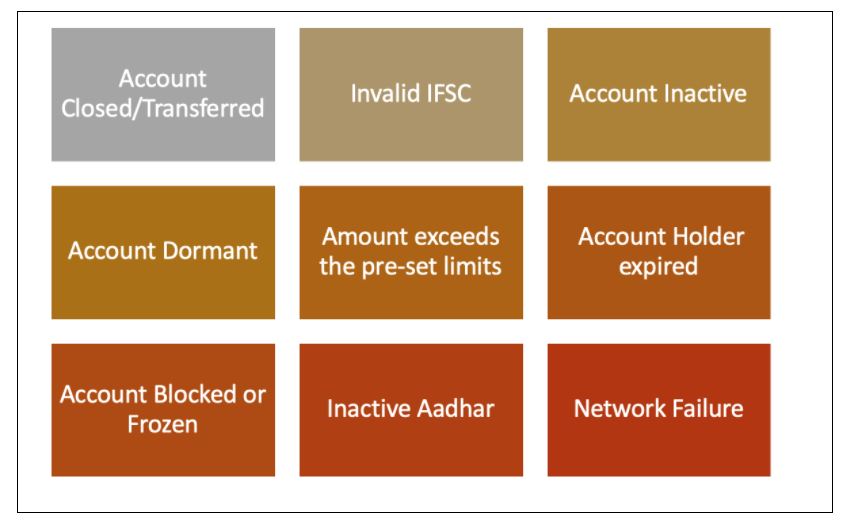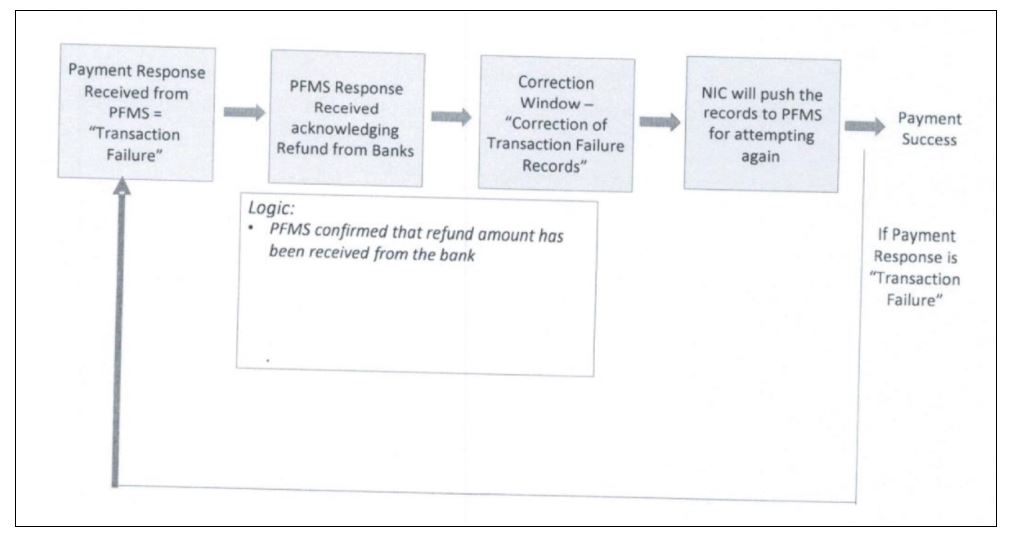PM-KISAN is one of the flagship schemes of the current government. Data till June 2021 indicates that more than 68 crore transactions have been processed under PM-KISAN of which around 61 lakh transactions failed, less than 1%. Only 20.9 lakh of these transactions were reprocessed successfully, and wide variation exists among states.
The Pradhan Mantri Kisan Samman Nidhi (PM-KISAN) was launched by the Government of India in 2018 to provide income support to the landholding farmers in the country. As per this scheme, the eligible beneficiaries would receive Rs. 6000 per year in 3 equal installments. The first installment was paid on 01 December 2018.
Under this scheme, the eligible beneficiaries register themselves. After due verification & validation of the application, the beneficiaries would receive the monetary benefit. The application process is a continuous one. The onus of selection & identification of the beneficiaries lies with the respective States/UT governments. The verified/validated data of the beneficiaries is uploaded on the PM-KISAN portal by the respective State/UT governments.
The benefits are transferred directly to the bank accounts of beneficiaries validated by the respective State/UT governments.
While due care is taken to verify the details, there are instances of failed transactions due to various reasons. There are also cases of ineligible beneficiaries being listed and receiving the benefit. Over the last few years, the government has come up with a process to identify & rectify such cases. We look at the numbers related to processed transactions, failures, etc. under the PM-KISAN scheme and also look at the mitigation process in place.
Uttar Pradesh & Maharashtra lead in the number of beneficiaries
In an earlier story, we observed that the coverage of farmers under PM-KISAN is around 75% of the total eligible farmers, with variation among the states. As highlighted earlier in this story, the enrolment of beneficiaries under this scheme is a continuous process. Therefore, the coverage of farmers has increased since the inception of the scheme with new farmers registering for the scheme.
Responding to a question in Lok Sabha in June 2021, the government stated that by the end of June 2021, a total of 68.76 crore transactions were done since the inception of the PM-KISAN scheme. Of these, nearly 24% of the transactions belonged to farmers in Uttar Pradesh i.e., around 16.35 crores. Maharashtra & Bihar account for the next highest number of transactions. Since the number of beneficiaries from these states is high, the number of transactions is also high. Data indicates that most of the transactions are from the North & Western states of India, indicating the concentration of a large number of beneficiaries in these parts. Comparatively, the Southern States and those in the East have fewer transactions because of fewer beneficiaries.
Around 1% of transactions have failed since the inception of the scheme
In the same Lok Sabha answer, the government further stated that a total of 40.16 lakh transactions failed since the scheme was introduced till June 2021. This accounts to around 1% of the total transactions processed till June 2021. In another question, the ministry cites the number as 61.04 lakhs between 01 February 2019 and 30 June 2021 out of which 20.88 lakh were reprocessed successfully.
The government has cited multiple reasons which result in the failure of transactions. Some of the important reasons for the failure of transactions are given in the following image.

A Standard Operating Procedure (SOP) is developed by the Central Government and provided to the States/UTs for action to be taken in case of any transaction failures. As per SOP, the steps to be followed in case of a transaction failure include:
- Only the records for which there is a ‘transaction failure’ are opened to the States/UTs for corrective action. This is done under the “Correction Module” tab of the PM-KISAN portal.
- PM-KISAN portal checks for all the records where the confirmation of refund is received from the Public Finance Management System (PFMS).
- It checks for all the transaction failure records which have been corrected by the States/UTs as well as those which do not need a correction i.e., network issues.
- All these records would be resent to PFMS for reprocessing and the payment of the respective installment.

Only around 34% of the reprocessed transactions were successful since February 2019
Responding to a question in Lok Sabha in August 2021, the government stated that a total of 61.04 lakh PM-KISAN transactions failed between February 2019 and June 2021. Of these, 20.88 lakh transactions were reprocessed successfully i.e., around 34 %.
The total value of the failed transactions during this period amounted to about Rs. 1221 crores. The total value of successfully re-processed transactions across the country amounts to Rs. 417 crores. During this period, around 40.16 lakh un-successful transactions are still pending, which amount to around Rs. 803 crores.
In the same answer, the government furnished the details of the failed transactions by the State. Among all the states, Madhya Pradesh has the highest number of failed transactions with around 16.96 lakhs but also has the highest reprocess success rate at 63%. The same is the case with Maharashtra with a 54% reprocess success rate out of 11.01 lakh failed transactions. These two states are the key contributors for the overall reprocess success rate to be around 34%.
The rest of the states have recorded lower reprocess success rates, with Tamil Nadu, Rajasthan & Andhra Pradesh being better off. Uttar Pradesh, Odisha, Bihar, Punjab & Telangana have a re-process success rate of less than 10%, of which Punjab’s is very negligible.
More than 33 lakh ineligible beneficiaries due to failure in Aadhar verification
While transaction failures are one of the prime challenges in PM-KISAN, the scheme also has the problem of ineligible beneficiaries. The exclusion of the benefices could be for various reasons – invalid Aadhar, non-eligibility of farmers as they have been identified to be income-tax-paying formers.
Responding to another question in the Lok Sabha in March 2021, the union government furnished the data of the excluded beneficiaries.
Excluded due to failure of Aadhar verification
A total of 33.44 lakh beneficiaries were excluded after paying one installment, due to the failed Aadhar verification. Of these, the highest number are in Uttar Pradesh with 12.96 lakhs, more than one-third of all such excluded beneficiaries. It is followed by Odisha & Rajasthan with 2.48 & 2.23 lakh excluded beneficiaries due to Aadhar.
Ineligible due to being Income-tax payees
Farmers who are income tax payees are not eligible to be a beneficiary under PM-KISAN. From the time the scheme was introduced, 33.74 lakh farmers have been excluded as they were identified as income-tax payers. Tamil Nadu has the highest number of such farmers with 6.96 lakhs, followed by Assam at 5.81 lakhs. Punjab, Maharashtra & Madhya Pradesh are the other states with higher numbers of such farmers deemed ineligible.
Around 31 lakh payments were stopped by the States due to various other reasons.
There is also scope for recovery of the funds transferred to the ineligible beneficiaries. As of 31 March 2021, a total of Rs. 261.74 crores have been recovered. The highest recovery is from Tamil Nadu with Rs. 162.54 crores followed by Maharashtra with around Rs.77.57 crores. A Standard Operating Procedure (SOP) is defined with respect to refund from the ineligible beneficiaries.
Need to resolve the high rate of pending failed transactions.
As highlighted earlier, the failed transactions account for only around 1% of the overall transactions which translates to around 61 lakh transactions since February 2021. Though the percentage is low, the number is huge from the perspective of beneficiaries who are denied the benefits due to transaction failures. The lower share of successful transactions on reprocessing is also a cause for concern. Except for Madhya Pradesh & Maharashtra, the success rate of reprocessing is poor in most other states.
Hence, there is an urgent need to identify the exact reasons for these failures and make efforts on war-footing to resolve them. Meanwhile, the cases of fraudulent or ineligible beneficiaries account for a lower share in terms of the total beneficiaries in the country. However, disparity exists within the states in terms of the volume of such beneficiaries. While this entire thing is a continuous process, there is a need for the centre & states/UTs to be more proactive & vigilant in identifying and excluding these ineligible beneficiaries, and also bring in controls to prevent them at the stage of the application itself.
Featured Image: PM-KISAN transactions


